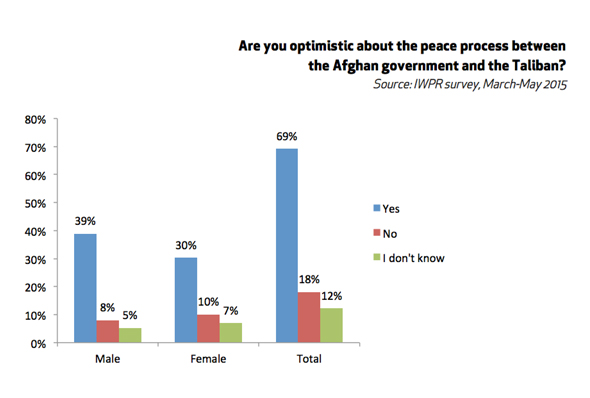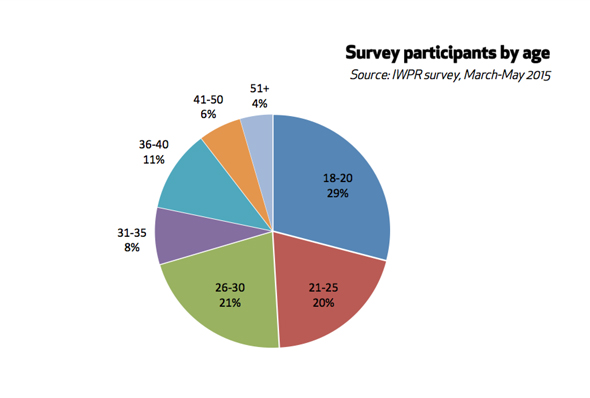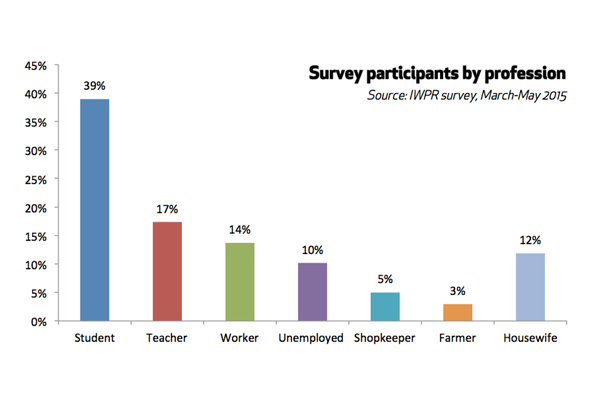Afghan Survey Suggests Optimism About Peace Talks
Mood of general support for reconciliation with Taleban, in a survey group of around 2,000.
Afghan Survey Suggests Optimism About Peace Talks
Mood of general support for reconciliation with Taleban, in a survey group of around 2,000.
In a survey which IWPR conducted across Afghanistan, the majority of the people questioned were optimistic about new peace talks between the government and the Taleban.
Years of stop-start negotiations have failed to halt the fighting, and the Kabul government and its opponents remain far apart on fundamental issues that would need to be agreed before a settlement became possible. In early May, however, officials and Taleban representatives had a meeting in Qatar that seemed to offer hope of progress, although both sides refused to describe the process as peace talks.
The survey was conducted among 2,061 people who attended debates across Afghanistan on the prospects for peace.
Asked “are you optimistic about the new peace process/talks between the Afghan government and the Taleban?” 1,415 or 70 per cent of the 2,030 who answered the question said “Yes”. Of the rest, 18 per cent (367 people) said they were pessimistic, while the rest were unsure (and 31 did not answer).

Men expressed greater optimism – 39 per cent of them felt positive, compared with 30 per cent of female respondents.
The survey group was made up of 1,089 men and 971 women, a 53/47 per cent split, and was divided fairly evenly across 19 provinces, with sufficient geographical diversity to be representative of all 34. Participants belonged to all age groups and represented a number of professions, but because the debates are focused on students and young people generally, the 18-to-25 age range accounted for 49 per cent of the whole group, and students 39 per cent.

Survey participants were asked what they thought the dangers of negotiating with the Taleban were. However, only 637 of the 2,061 in the survey group answered this question. Of those limited responses, the largest grouping predicted no particular risks as long as the process was conducted properly (41 per cent; 264 people) and the second largest (118 people) saw dangers to Afghanistan’s current laws and to women’s rights. They were also asked about the risks of not talking to the Taleban, but only 605 responded, most of them predicting continued conflict.
Commenting on the survey findings, Amin Watanyar, who leads a group called Supporters of a Reconciliation Policy, says most Afghans support peace, but are concerned that it might involve too many concessions to the insurgents.
“People’s main concern is that no deal should be made with the Taleban that compromises their interests,” he said.
The survey also polled participants’ views of practical ways towards peace, about 70 per cent (1,359 out of 1,948 respondents) saying Pakistan should be involved in the peace process, and 55 per cent (1,073 or 1,956) saying the Afghan population should be part of a sustainable peace.
Most of the survey participants were attending the series of nationwide debates held IWPR’s Afghan Reconciliation initiative, which aims to draw citizens into a nationwide discussion on how to move beyond the cycle of conflict. The remainder were participants in similar-format debates for the Youth and Election project, which focuses on boosting participation in the democratic process. As said above, many were students, others were teachers and all were literate, making them part of a minority in Afghanistan.

The IWPR survey was intended to gauge people’s expectations of the peace process, and the finding will form part of a set of recommendations which IWPR will present to the government as it continues to work towards a deal.
Launched last September, the Afghan Reconciliation project is expected to reach at least 18,000 people and will culminate in a three-day peace conference in Kabul.
